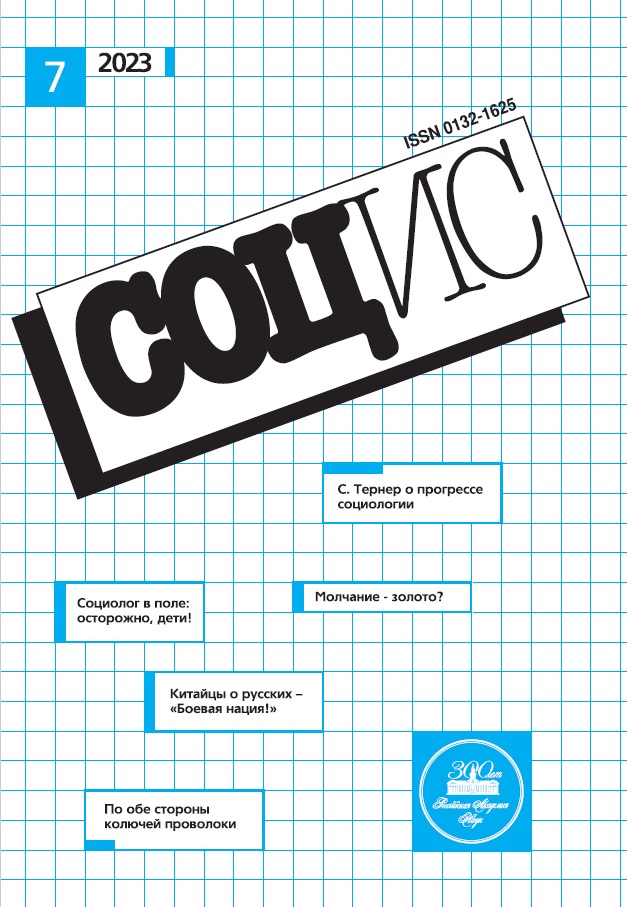Individual and Generational Futures in the Urban Youth Narratives in St. Petersburg
- Autores: Nartova N.A.1
-
Afiliações:
- HSE University – St. Petersburg
- Edição: Nº 7 (2023)
- Páginas: 93-104
- Seção: Articles
- URL: https://kazanmedjournal.ru/0132-1625/article/view/661760
- DOI: https://doi.org/10.31857/S013216250024233-9
- ID: 661760
Citar
Texto integral
Resumo
The focus of the article is on urban educated young people's perceptions of individual and generational futures. Drawing on perspectives from the sociology of transition to adulthood, the organization of biographies and the generational approach, qualitative interviews collected in 2020 and 2022 with St Petersburg residents aged 19-25 were analyzed. The study showed that socio-political events lead to a transformation of the generational narrative. The discourse of a bright generation, open to the future, is replaced by heterogeneous types of interpretation of the perspectives of one's own life and the generation as a whole. Three key narrative modes have been identified in which life experiences have been linked to representations of life perspectives: an 'absent future', an 'adaptive future' and an 'normalised future'. As the process of generational change is incomplete, this study captures some moments of dynamic change and raises new questions rather than providing final answers.
Palavras-chave
Bibliografia
- Александер Д. Культурная травма и коллективная идентичность // Социологический журнал. 2012. №3. C. 6–40.
- Зубок Ю.А. Выступление дискутанта // Ученые записки ФНИСЦ РАН. Вып. 12. Образ будущего России в условиях глобальных рисков / Отв. ред. Ю.А. Зубок. М.: ФНИСЦ РАН, 2023. 43–49.
- Кравцова А.Н., Кузинер Е.Н. Быть взрослым и/или уметь им быть: модели взросления ранних миллениалов // Мониторинг общественного мнения: экономические и социальные перемены. 2022. № 2. С. 120–139.
- Мангейм К. Очерки социологии знания. М.: ИНИОН РАН, 2000.
- Митрофанова Е. С. Модели взросления разных поколений россиян // Демографическое обозрение. 2019. № 6 (4). С.53–82.
- Нартова Н.А., Фатехов А.М. Переход во взрослость российских миллениалов: на пути от получения образования к обретению ответственности и потере оптимизма? // Мониторинг общественного мнения: экономические и социальные перемены. 2021. № 4. С. 319–344.
- Нестик Т.А. Образ будущего России в условиях глобальных рисков // Ученые записки ФНИСЦ РАН. Вып. 12. Образ будущего России в условиях глобальных рисков / Отв. ред. Ю.А. Зубок. М.: ФНИСЦ РАН, 2023. С. 7–22.
- Образ будущего России глазами молодежи / Под ред. В.С. Комаровского. М.: Аспект Пресс, 2021.
- Ученые записки ФНИСЦ РАН. Вып. 12. Образ будущего России в условиях глобальных рисков / Отв. ред. Ю.А. Зубок. М.: ФНИСЦ РАН, 2023.
- Arnett J.J. Emerging Adulthood: The Winding Road from the Late Teens Through the Twenties. Oxford: Oxford University Press, 2015.
- Aroldi P. Generational belonging between media audiences and ICT users // Colombo F., Fortunati L. (eds) Broadband Societies and Generational Changes. Brussels: Peter Lang GmbH, 2011. Р. 51–68.
- Bessant J., Fathing R., Watts R. The precarious generation. A political economy of young people. London, New York: Routledge, 2017.
- Biggs S., Lowenstein A. Generational Intelligence. A Critical Approach to Age Relations. London, New York: Routledge, 2011.
- Brannen J., Nilsen A. Individualisation, Choice and Structure: A Discussion of Current Trends in Sociological Analysis // The Sociological Review. 2005. Vol. 53. No. 3. P. 412–428.
- Corsten M. The Time of Generations // Time and Society. 1999. Vol. 8. No. 2–3. P. 249–272.
- Facchini C., Rampazi M. No longer young, not yet old: Biographical uncertainty in late-adult temporality // Time and Society. 2009. Vol. 18. No. 2-3. P. 351–372.
- Hajdu G., Sik E. Are the work values of the younger generations changing? // O'Reilly J., Leschke J., Ortlieb R. et al. (eds) Youth Labour in Transition: Inequalities, Mobility, and Policies in Europe. Oxford: Oxford University Press, 2018. P. 626–659.
- Heckhausen J. Social Inequality Across the Life Course: Societal Unfolding and Individual Agency // Scott R.A., Buchmann M.C., Kosslyn S.M. (eds) Emerging Trends in the Social and Behavioral Sciences: An Interdisciplinary, Searchable, and Linkable Resource. John Wiley & Sons, Inc., 2016. P. 1–18. URL: https://onlinelibrary.wiley.com/doi/abs/10.1002/9781118900772.etrds0408 (дата обращения: 24.04.2023).
- Hitlin S., Kirkpatrick Johnson M. Reconceptualizing Agency within the Life Course: The Power of Looking Ahead // American Journal of Sociology. 2015. Vol. 120. No. 5. P. 1429–1472.
- Krahn H. J., Chai C., Fang S. et al. Quick, uncertain, and delayed adults: timing, sequencing and duration of youth-adult transitions in Canada // Journal of Youth Studies. 2018. Vol. 21. No. 7. P. 905–921.
- Leccardi C. Changing time experience, changing biographies and new youth values // Hahn-Bleibtreu M., Molgat M. (eds) Youth Policy in a Changing World. From Theory to Practice. Opladen, Berlin, Toronto: Barbara Budrich Publishers, 2012а. Р. 225–237.
- Leccardi C. Young people and the new semantics of the future // SocietaMutamentoPolitica. 2014. Vol. 5. No. 10. Р. 41–54.
- Leccardi C. Young people’s representations of the future and the acceleration of time. A generational approach // Diskurs Kindheits- und Jugendforschung Heft. 2012. No. 1. P. 59–73.
- Pultz S., Mørch S. Unemployed by choice: young creative people and the balancing of responsibilities through strategic self-management // Journal of Youth Studies. 2015. Vol. 18. No. 10. Р. 1382–1401.
- Riessman C.K. Narrative Analysis // Kelly N., Horrocks C., Milnes K. et al. (eds) Narrative, Memory and Everyday Life. Huddersfield: University of Huddersfield, 2005. Р. 1–7.
- Shanahan M.J. Pathways to Adulthood in Changing Societies: Variability and Mechanisms in Life Course Perspective // Annual Review of Sociology. 2000. No. 26. P. 667–692.
- Smith C. Conclusion // Smith C., Christoffersen K., Davidson H., Herzog P.S. (eds) Lost in Transition: The Dark Side of Emerging Adulthood. Oxford: Oxford University Press, 2011. Р. 226–243.
- Vinken H. Changing life course, citizenship and new media: the impact of reflexive biografization // Dahlgren P. (ed.) Young citizens and new media. Leaning for democratic participation. New York, London: Routledge, 2010: 41–57.
Arquivos suplementares










